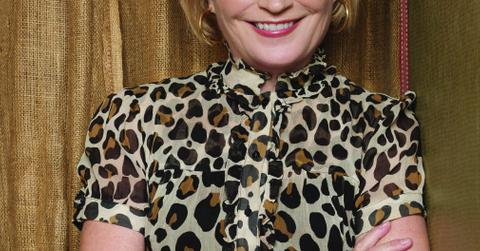The amount of wisdom Kate White, author and former editor-in-chief of Cosmo, has when it comes to making power moves in the workplace, writing and how to be a little more gutsy will truly leave you speechless.
But, rightfully so. Her resume includes: 14 years of running one of the top magazines in the world, and she’s author of 12 suspense novels and three career books.
In her latest book, The Gutsy Girl Handbook: Your Manifesto for Success, White breaks down the nine core principles she’s used in her career and how you can apply them to any level.
In this interview, White reminds us that you are the architect of your career and not to play small. She also goes into detail about the four b’s that has helped her: how to go bigger, and be better, bolder and badass. Here’s our conversation.
Her Agenda: I feel like some women are tight-lipped on their success, but you’re pretty much an open book. So, tell me what is one thing that you did to stand out when you were a young journalist?
Kate White: Well, I think one example would be to do something that wasn’t being done before at the magazine I was working at. I was working at Glamour Magazine and for the most part Glamour ran more straight journalistic pieces: service, self-help, health, fitness, fashion, and beauty of course. And, I was writing very, very short pieces for a little section they had. I wanted to expand and do something bigger, so I came up with an idea that had a health angle to it and I went to the editor-in-chief and I pitched it and she said, ‘Well Kate, you don’t have any experience as a real reporter. I would never be able to assign you this piece.’ So disappointed because I was in a catch-22. I wasn’t going to get any experiences as a reporter there because they wouldn’t let me report pieces and I really wanted to write longer pieces, so that I could raise my profile as a writer. So I started thinking about it. I thought ‘Okay, what if I wrote a piece that didn’t require any research so she couldn’t say, you don’t have any reporting experience.’
Glamour didn’t really have essays at the time, but it was a powerful moment in the US, in terms of single women. For the first time, women weren’t getting married right out of college or high school and they were flocking to urban areas to make their way in careers. So, I wrote a piece about being single. Just a third-person, kind of funny piece. They loved it, ran it and started having me write more and more first-person pieces and then I got my own column.
I think sometimes you have to ask yourself: what can I do, that may go against the grain a little bit, but still serve the needs of the organization? You can’t be a rule breaker in a way that’s only going to serve your needs because it won’t get you very far. But I do think it’s important to do more than what we’ve been told to do and do it well. You have to go big or go home. And I think that was one of the first examples of going big for me that really paid off.
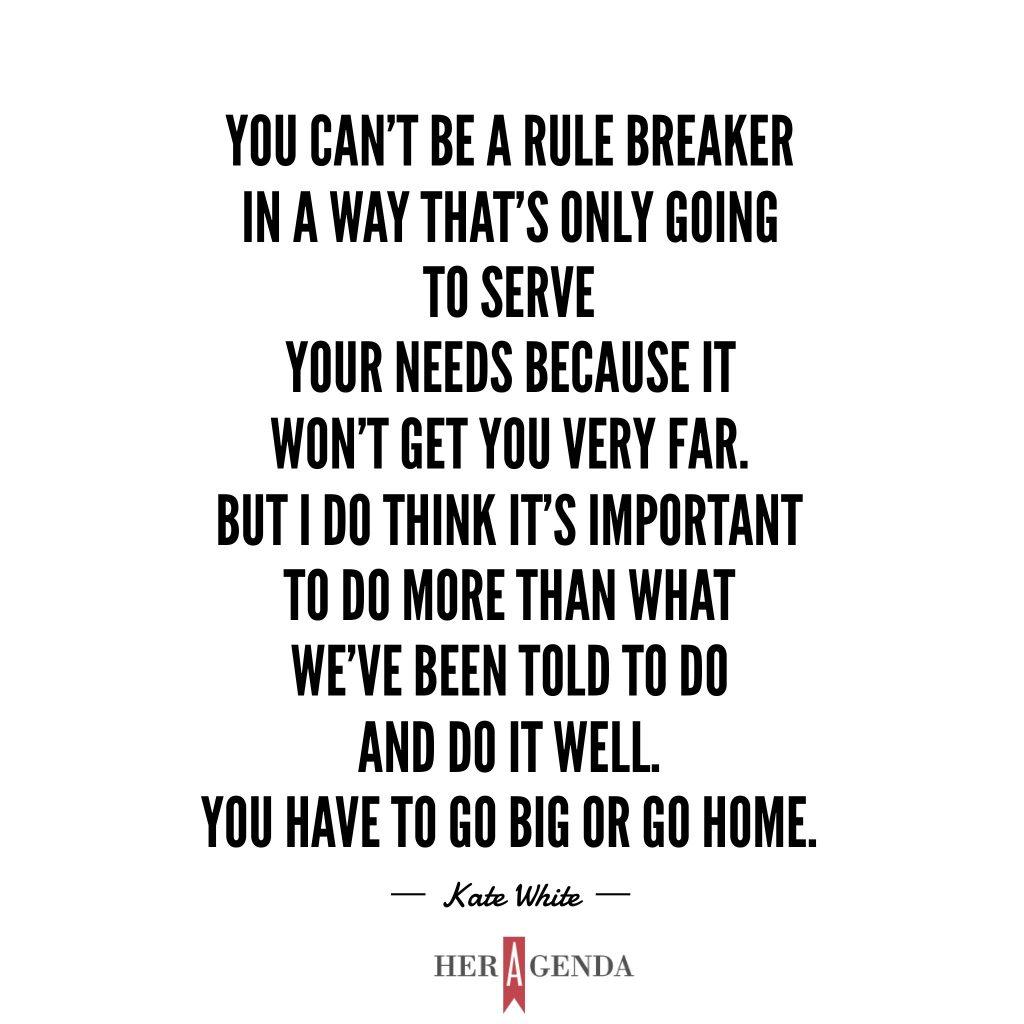
Her Agenda: I love how you took risks in your career. Just to be transparent, I have a tendency to work harder for other people, but not for myself, which is a little weird, right? I know I’m not the only woman or person that goes through that. They’ll go hard for a company, but when it comes to their own personal project, they don’t go as hard. What is the first step to taking that bet on yourself? How do you go about that?
Kate White: Well, I think it’s really, really important to be the relentless architect of our careers and to know that it’s important to manage your success in your career as well as you manage your job. We get so caught up sometimes managing our jobs and figuring out how we’re going to hopefully dazzle our boss and do things there that we don’t do the same with our careers. And, I really recommend spending at least 30 minutes every week just evaluating where you are in terms of your career. Are you happy? Are you going big as much as you should be? Are there steps that you should be taking? What are those steps? How could you go bigger, better, bolder or more badass in your career? And then what do you have to do to take those steps because you don’t have a strategic situation where you do that every week. I think it’s very easy to get sucked into: okay, now you’re at your job. Six more months and now another year and then another year without really looking at how you need to kick your career on the butt.
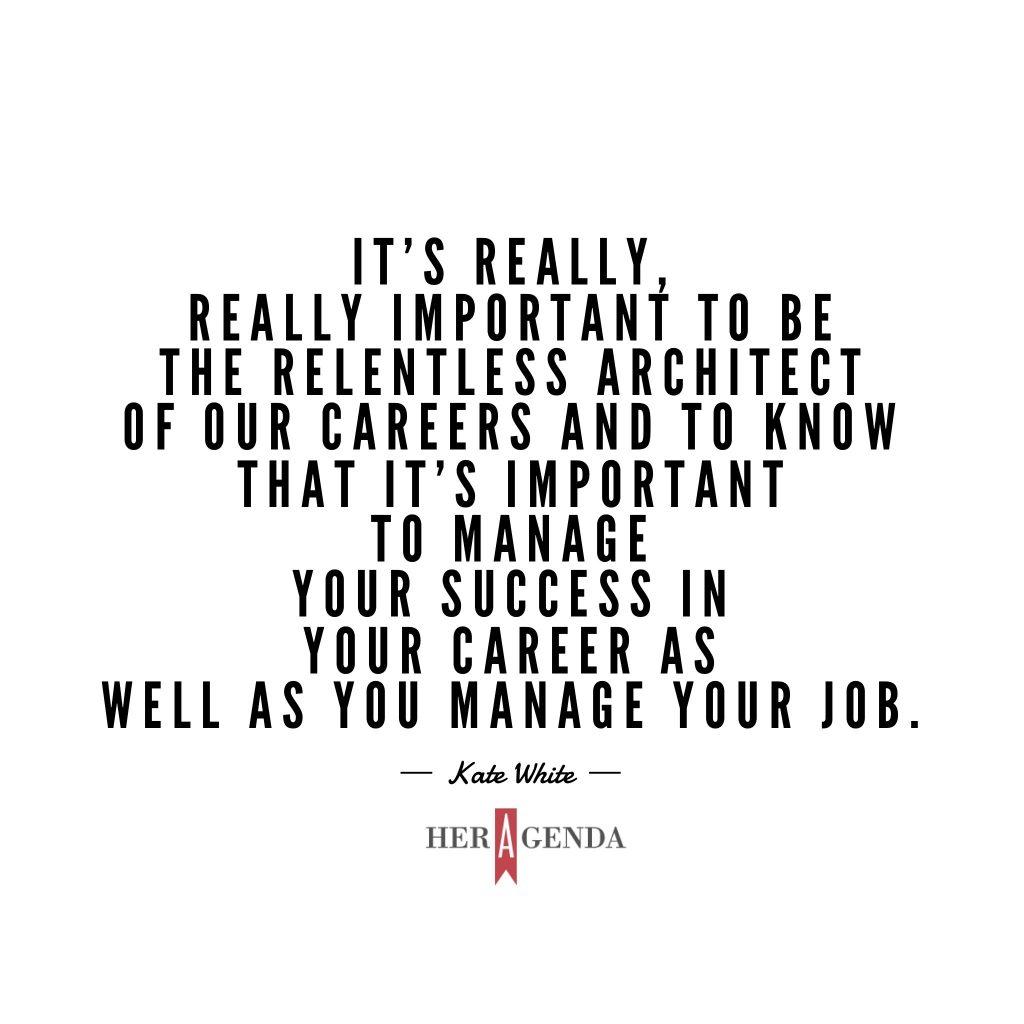
Her Agenda: I love that. Putting the same effort that we put into our jobs, into our careers, into ourselves and create a strategic plan.
Kate White: Right! And is there a go big move you need to make for instance? An example of me doing that is when I decided to write that essay. If I had just been doing my job, I would have been writing every month, a dozen little pieces for Glamour for the hottest do-anything-better guide. And they were pieces like how to get rid of the pimple by Saturday night, four things you should know about birth control pill and how to deal with insomnia. Just little, little pieces. But I basically sat home one night and said they won’t let me write a reporting piece. So what do I do? Is there a way to achieve my needs by going through a side door, for instance?
You see, great basketball players, if there’s no move available, they’ll create one. And sometimes you have to, if you want to go big in your career. That’s just your job, you have to create opportunity and it’s only when you sit down with yourself and think it through, you can come up sometimes with the idea of what would be that opportunity.
Her Agenda: What are some common traps that young writers should always try to avoid?
Kate White: One mistake I see people make is not reading enough of what other writers are doing. You need to read other writers work to see how inventive they’re being, how expansive there being, ways they’re opening a story up to make you want to read it. So, I think it’s so important to be reading, see what’s going on and when you see someone brighter doing something cool instead of letting yourself get too frustrated or maybe envious, just think, ‘Okay, I loved the way she grabbed me by the lapels from the moment she started this article. I don’t have to open my article the same way she did, but maybe I need to think about taking it up a notch in terms of how I open my own articles.’ And it’s only from reading that we see what the trends are. I think also to look at the kinds of pieces that get great traffic.
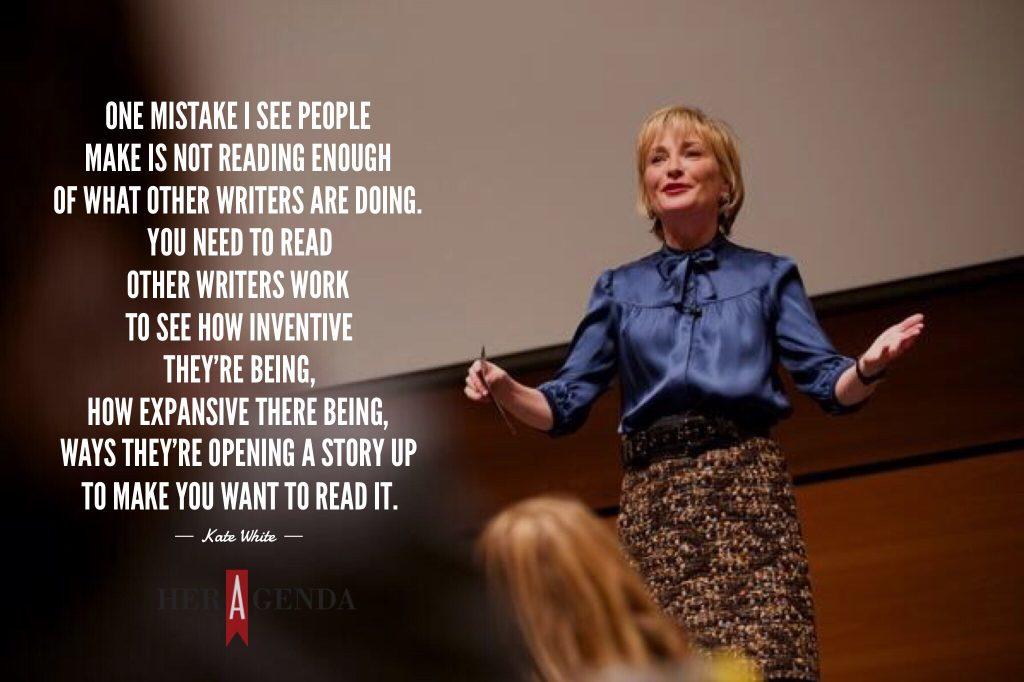
When you see something’s gone viral, now you can see how many people read it. You can look at Ted Talks and see how many people watched it and it gives you an idea of what the conversations that are attracting attention, what people are intrigued by, and you can’t always just write what you want to write. As someone once said to me, ‘You have to do more than think about what you want from the world. You have to think a bit about what the world wants from you’ because you can write all you want, but if you want to be a success at it in terms of not only eyeballs and traffic, but money, you’ve got to pay attention to the marketplace.
Her Agenda: Take me back to when you started your transition, preparing your letter of resignation to become a full-time author. Take me through that process a little bit. What was going through your mind?
Kate White: I actually gave three years notice. It really allowed me to prepare. But part of why I was able to do it was because I stacked away the money to do it and I could walk away without it being a risk and I was certain age, so I could do it. A woman I know [named Nely Galan] wrote this great book called ‘Self Made.’ She says buy buildings not shoes. Live beneath your means and which can eventually allow you to do your own thing. And what I really did was work for a long time at corporations. I had a great nest egg. So, in some ways it looks like a leap of faith, but it wasn’t so much of a leap of faith. Because if I didn’t make a dime I would’ve been fine. But I have made a dime doing it. It’s been nice. I’ve made some nice money in this second career of mine. But, I didn’t have to do that.
Now what if I were younger? What if I wanted to do this at 45 and I had to make money? I would say try to get your ducks in a row, run the numbers, make sure you can do it, test the waters, if you can beforehand. If you want people to invest in your business, you really have to be willing to do it full time. But if you’ve got a side hustle, then commit to your full time job and do it on this side and make sure you really want to do it. I wrote eight murder mysteries before I left Cosmo and so I knew I’m not going to have a problem working at home alone. I know how to sit in a room and write for number of hours and not get distracted. So the more you can experiment beforehand, the better. And run those numbers, make sure you can afford to do it.
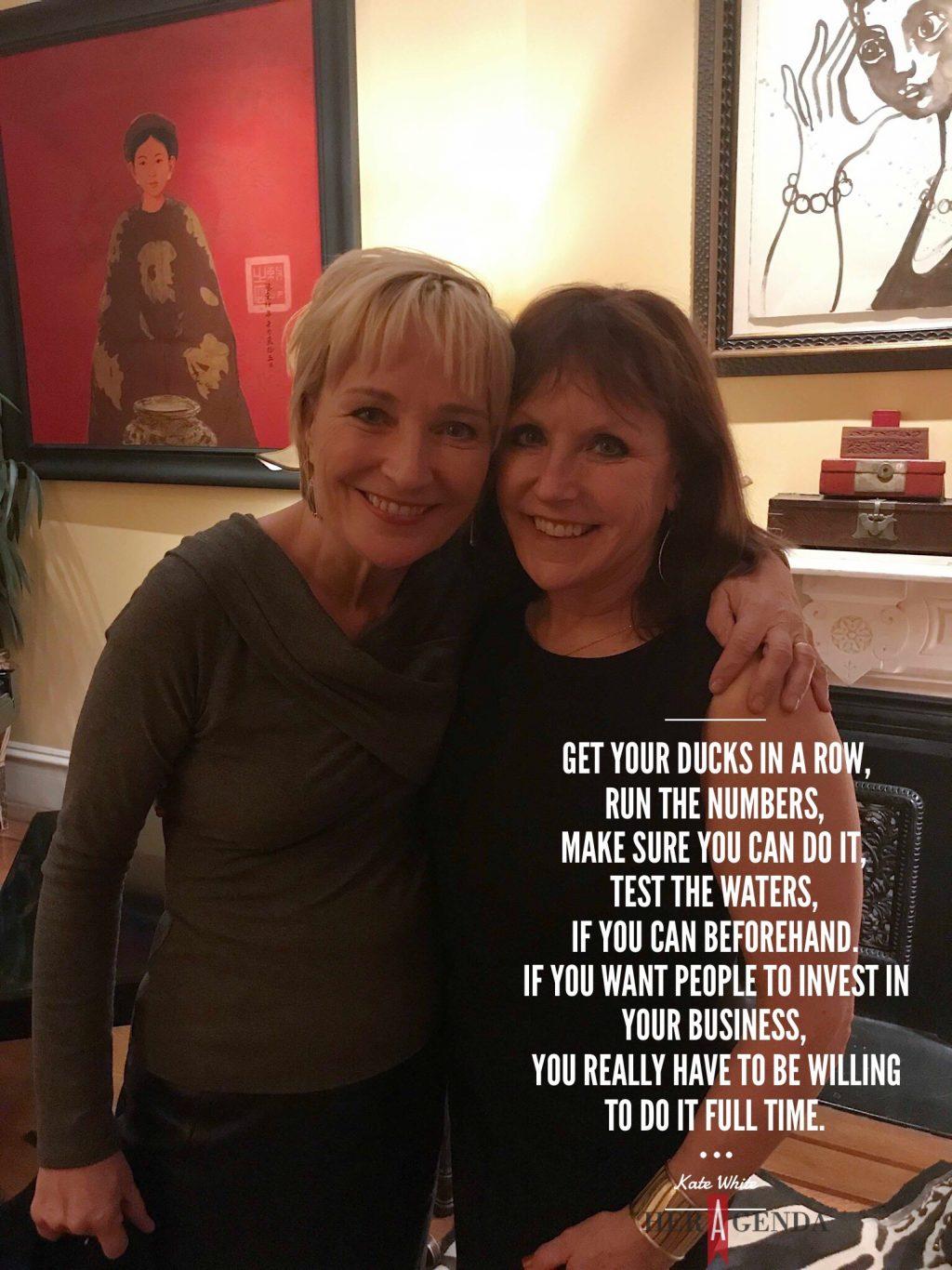
Her Agenda: Do you ever experience writer’s block?
Kate White:Not really, and I’ll tell you why. I just finished my 13th crime novel and I guess I’ve written three career books. What happens when you work in a magazine? It teaches you how not to have writer’s block. You can’t ever just say one day when you have a full time job, but on a magazine. ‘Oh, I’m just not in the mood’ or ‘I can’t come up with anything.’ You have to! There’s a deadline staring you in the face. What you want to do is just get something down and sometimes you can’t get something down it’s often because you don’t have enough to say about it. Meaning you haven’t thought it through enough or you haven’t done enough research. So when I was doing a piece for a magazine and I thought ‘I’m stumped’ often I knew that meant, you know what? I need to interview two more people here. I’m not getting clarity on this topic.
And so now if I had any kind of writer’s block in terms of a novel, usually just means I haven’t thought it through enough. I haven’t done enough homework and I don’t let myself get up from my desk. I know, hey, I’m going to work today until this time and I’m going to be here and if it’s not good I’m still going to put it down because I can tweak it tomorrow. And that’s what working at magazines really helped me learn.
Her Agenda: You mentioned in an interview how it’s really important to diversify your skill set. Now in this day and age, let’s say you’re hiring, how can they diversify their skill set?
Kate White: Well, that’s such a good question and what I’m going to say now, may seem to contradict it, but I’m a believer that one of the things you do in your career is strengthen your strengths and don’t worry so much about your shortcomings or the things you don’t do well. And if you look at really great brands, they don’t try to be all things to all people. So I don’t think you should diversify to the point of you’re learning to be fairly good at things you really don’t care about.
You want to become an expert in something and not try to be an expert at everything. What new skills are related to your area of expertise and your strengths? It’s important to know what that’s going to entail.
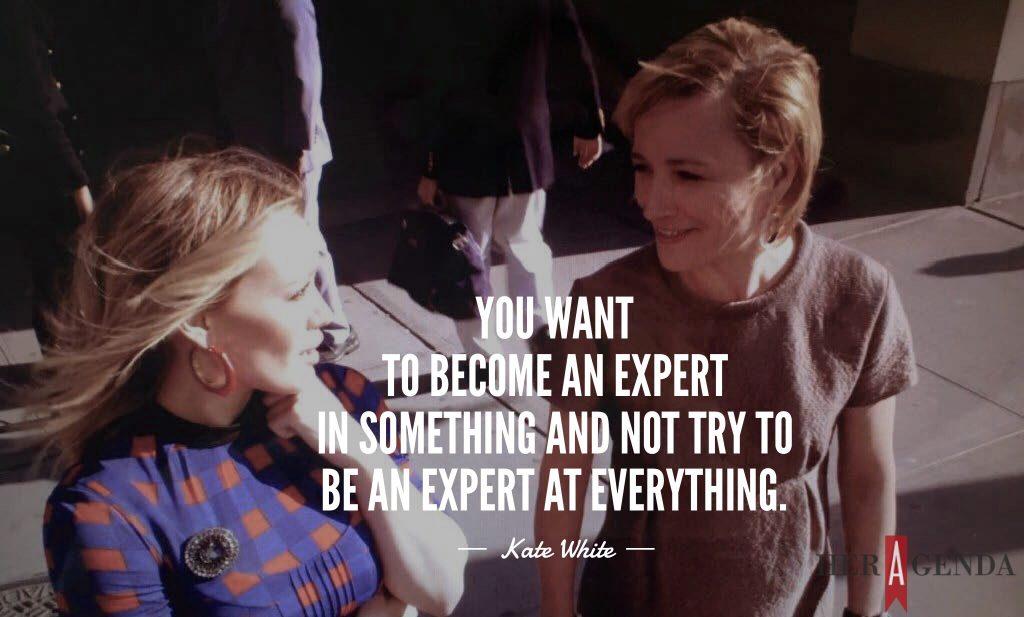
The weaknesses of yours, those you can marginalize, and you just don’t do them. Like for instance, for me, I was never super interested in fashion the way some magazine editors are. My first boss at Glamour was the same way. Then you delegate it to a really great fashion editor. Now I was great at picking the post for the cover. I knew exactly what would sell on the cover and my fashion editor often wanted things that were much more fashion forward that I thought, you know what, that’s not going to sell 2,000,000 copies and I’m going to put Beyoncé in something else. so it wasn’t a fashion was a foreign thing to me, I wasn’t interested in it to the degree of some editors. So instead of trying to learn everything I could about fashion, I marginalized that, and I delegated it. My areas of expertise were idea generating, cover lines, having an incredible sense, as a leader, connecting with the reader.
I had to learn things as well. I had to learn how we could create apps for the magazine, how to represent the magazine on Twitter every month and learn what I could from it. Is there anything to be gained by studying the responses. In terms of digital? Yes. I had to get up to speed on that.
Her Agenda: We all have our shortcomings. For someone at my age still trying to prove themselves. If I make a mistake at my job, how do I go about it?
Kate White: If it’s a significant mistake own it. I think one mistake that I see young people make, maybe a little bit more millennials than Gen X, is that they wouldn’t want to own it. They would get defensive about it. ‘Well, I thought you said to do this.’ It’s really important to own your mistake, but not to wallow in any kind of despair about it. Move on, but learn from it. One study I saw said that high achievers tend not to scribe enough blame to their mistakes, and that’s complicated by the fact that when we get home at night after having had a setback and we talk to our friends or lovers or partners, they tend to take our side ‘Oh, that guy’s a jerk! Of course he’s going to beat you up about that,’ or ‘What are they talking about? I thought your idea was brilliant. I’m sure you sounded great,’ but it really helps if you can step back and say, ‘Why did that blow up? Was I not paying attention? Did I not cross every T. And how do I make sure I learn from this?’
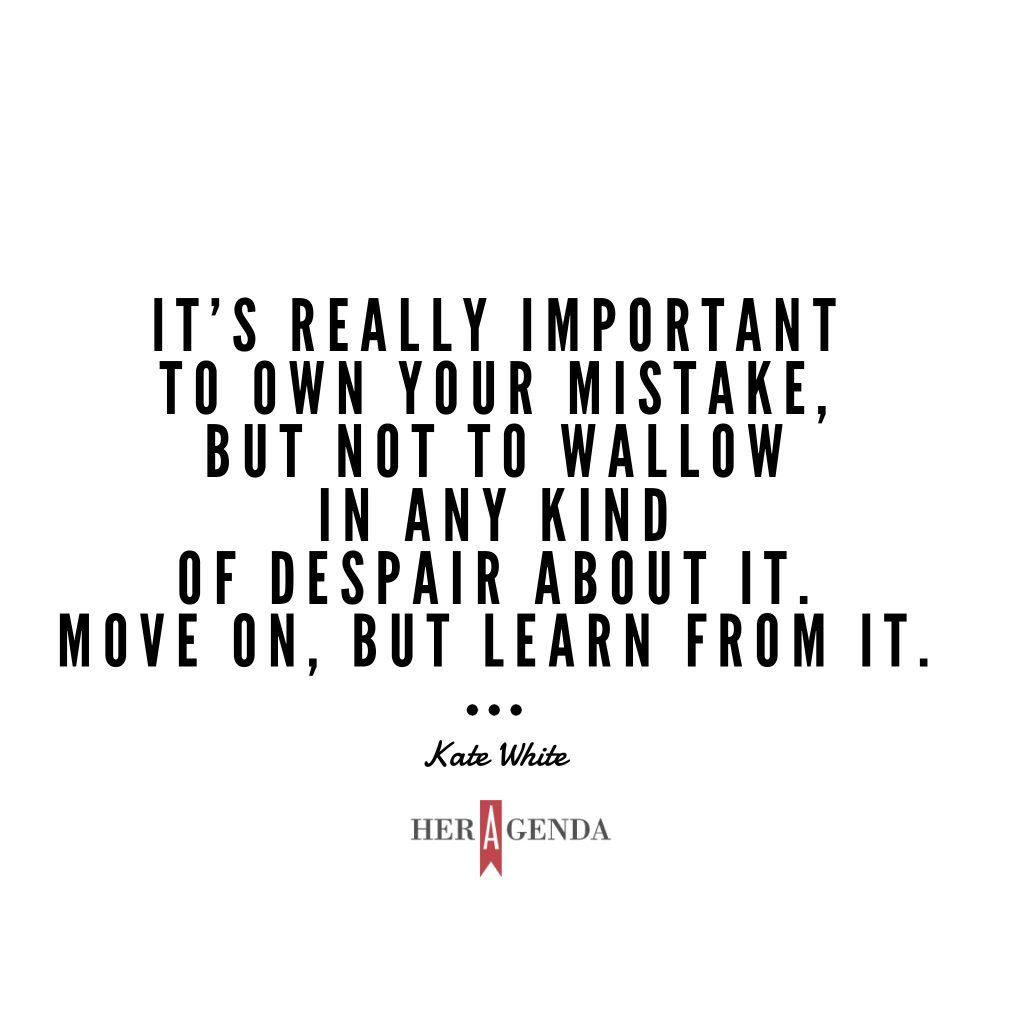
With covers, as painful as it was when we had a dud, and fortunately my wins vastly outnumbered by losses, I would study that, sometimes for a couple of hours along with a bunch of other covers on my floor and just try to get a sense of why didn’t that work as well as I thought it was going to. And sometimes it was a distance of a few weeks from the moment it went to press to the moment I got that. It was a couple of weeks I would be able to go ‘ok, that top line was just too vague’ or ‘the outfit I put her in was too wintery for April.’
Her Agenda: So you say own your mistakes.
Kate White: Own them, learn from them and then move on. Don’t wallow in it. Failure is a big part of our work life. We need to accept that it’s normal. We’re all going to make mistakes, just try to learn and move on.
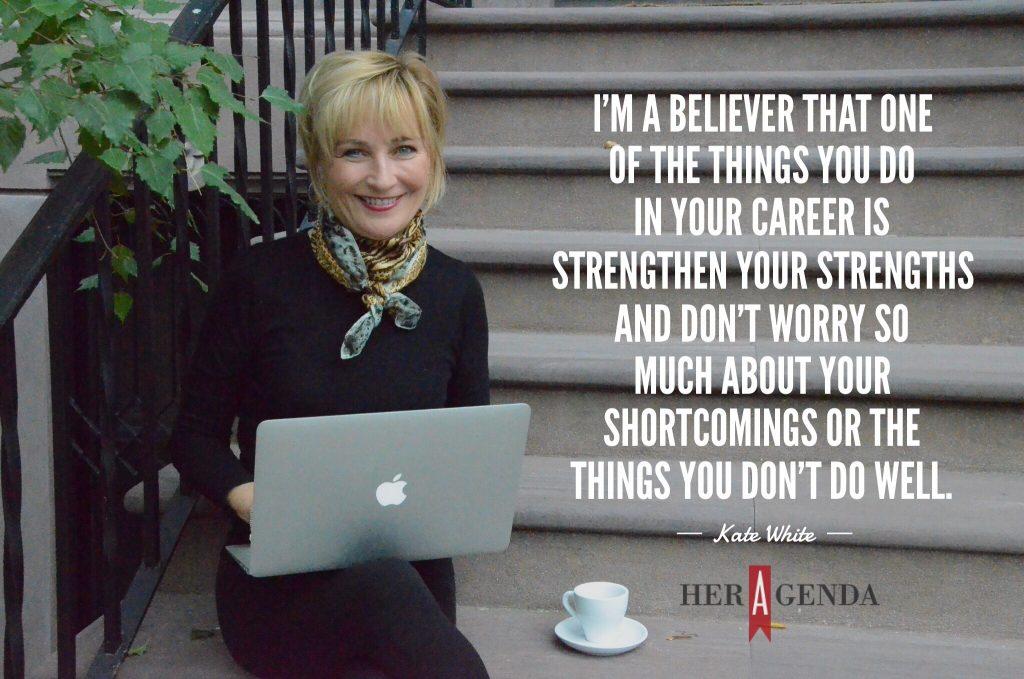
Her Agenda: And, lastly, your motto. What is your motto, that mantra that keeps you going, that gets you up everyday?
Kate White: I think it is ‘Go big or go home’ to step back from everything you’re doing and just make sure you’re not just doing it the same old way you’ve always done it. Ask yourself what I call the four B’s: could it be better? Could it be bigger? Could be bolder, Could it be more badass? So that you have a way of looking at it and saying, yeah, maybe I could color outside the lines with this and then take the opportunity to make it bigger. Working at Cosmo really helped me to do that because Cosmo was over the top. You had to regularly be asking yourself, how can I shake it up here?
Paulana, there was question that you had about applying for jobs. I would love to just answer that because I think that’s a important question for young people to know.
Her Agenda: Absolutely!
Kate White: One thing people do that, they don’t realize they do when they’re applying for jobs is to not show enough enthusiasm and passion. I saw studies that said that the number one problem that job interviews had with candidates was lack of enthusiasm and I used to see that a lot. I don’t think it was always intentional. Sometimes could be nervousness, but it also might be the person thinking, ‘I want to seem really professional here. Very buttoned up.’ But people love enthusiasm.
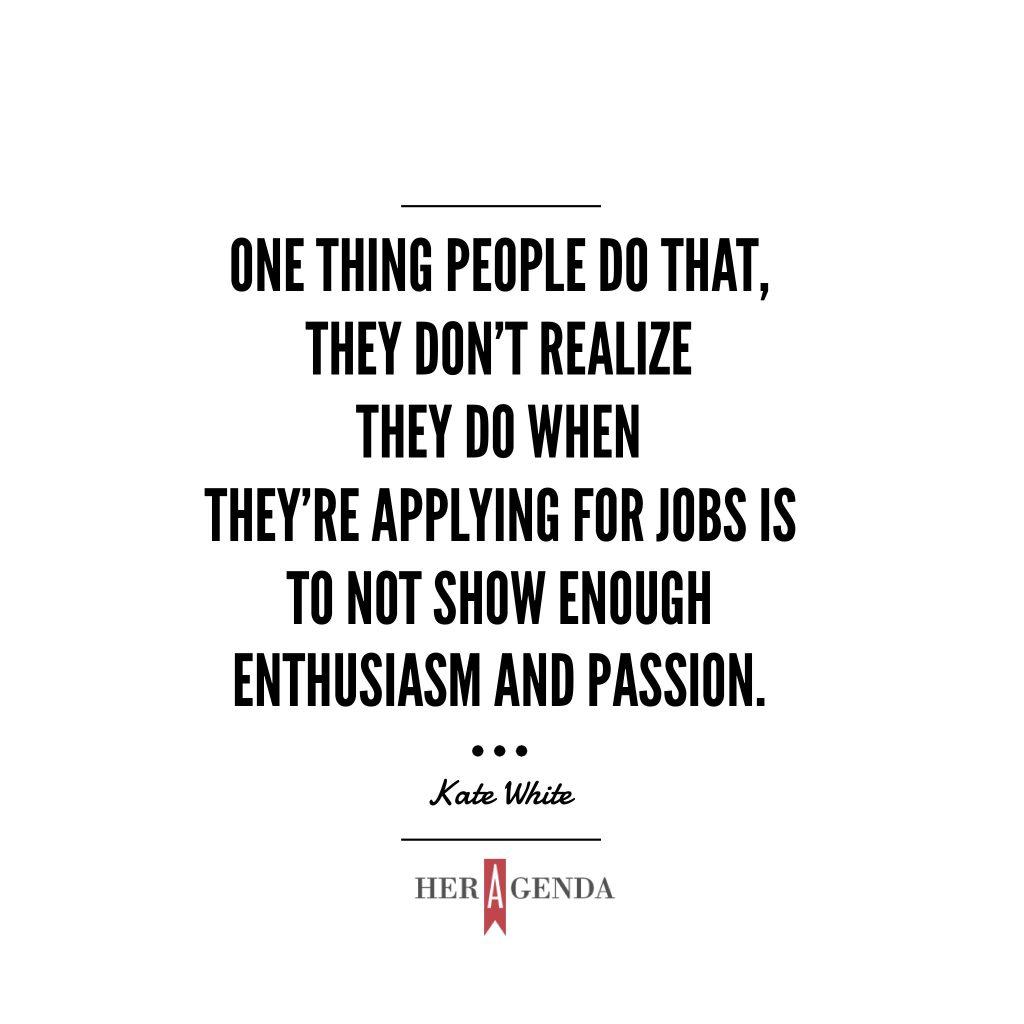
A former talent recruiter said to me that really great candidates sit a little bit on the edge of their seat because they’re excited to be able to show how much you want to be there and part of showing that excitement and passion is having really great questions and really knowing something about the person you’re interviewing, so that you can say something like, ‘Jesse just made this switch or that switch. I see you’re now doing this as a company. How’s that working for you? I’d love to hear a little bit about why you made that decision’ And lastly, it’s really important interviewees not to use the word ‘or.’ Don’t say ‘I want to be this or that.’ I would have people come in and say, ‘I want to be in fashion or beauty.’ Those are two totally different areas and even if you’re not sure, you’ve got to cheat a little bit. In the interview, choose one.
[Editor’s note: This interview was published on May 14th, 2018. It’s been edited for length and clarity.]

